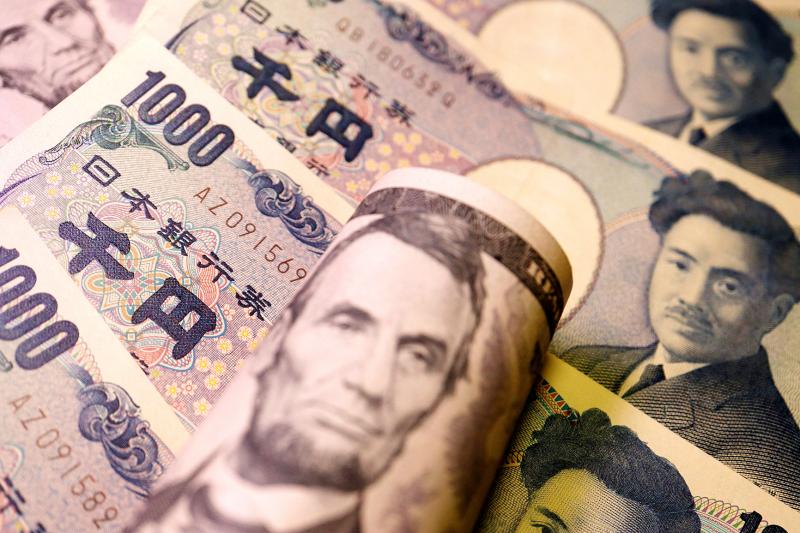The Japanese yen fell against the US dollar on Friday, after the Bank of Japan bucked a wave of tightening and stuck with its ultra-accommodative stance, adding to soaring volatility in a currency markets hit by a series of rate hikes this week.
Currency markets have been roiled by one of the biggest runs of monetary policy tightening in decades, including the US Federal Reserve’s mid-week 0.75 percent rate increase, its biggest since 1995, and the Swiss National Bank’s surprise decision to hike rates by 0.5 percent.
The Bank of Japan (BOJ) went against the current on Friday, keeping all of its policy settings unchanged and vowing to defend its bond yield cap of 0.25 percent with unlimited buying.

Photo: Reuters
The BOJ’s move knocked the yen, which on Wednesday hit a 24-year low of ¥135.6 per US dollar, broadly lower. It closed down 2.11 percent against the greenback at ¥134.96.
“Today we’re seeing a rebalancing of the market. It’s been a very volatile week,” said Simon Harvey, head of FX analysis at Monex Europe. “Markets are still adjusting to the central bank meetings from throughout the week.”
The US dollar rose off a one-week low against major peers, following a two-day slide after the Fed’s mid-week rate increase of 0.75 percent, a move that was anticipated by markets as the Fed attempts to tame stubbornly high inflation.
The US dollar index, which measures the currency against a basket of six rivals, was up 0.98 percent at 104.65, posting a weekly increase of 0.48 percent.
US Treasury yields held at lower levels on Friday after a volatile week that saw yields hit more than 10-year highs on expectations of aggressive rate hikes, and then fall on concerns about how they would affect growth.
The New Taiwan dollar rose against the greenback on Friday, gaining NT$0.015 to close at NT$29.720, but losing 0.46 percent over the week.
The Swiss National Bank’s (SNB) surprise decision to raise rates by 0.5 percent continued to reverberate through markets.
The euro closed down 0.5 percent at US$1.0497 versus the US dollar.
The franc rocketed to a two-month high on Thursday after the rate hike and boosted by a sense among investors that the SNB would not try and stop a strengthening franc as it has in the past.
Giving up earlier gains on Friday, the US dollar lost 0.39 percent to 0.9702 francs, after tumbling the most in seven years overnight.
“The surprise rate hike in Switzerland, as well as the European Central Bank’s announcement that it is working on a tool to prevent the fragmentation of the European bond markets, will help to limit USD strength around current levels,” strategists at UBS’ Global Wealth Management’s Chief Investment Office said in a research note.
Sterling dropped 1.03 percent to US$1.2223, giving back nearly all of its overnight gains from when the Bank of England decided to lift rates again, albeit by less than many in the market had expected, along with a hawkish signal about future policy action.
Additional reporting by CNA, with staff writer

In Italy’s storied gold-making hubs, jewelers are reworking their designs to trim gold content as they race to blunt the effect of record prices and appeal to shoppers watching their budgets. Gold prices hit a record high on Thursday, surging near US$5,600 an ounce, more than double a year ago as geopolitical concerns and jitters over trade pushed investors toward the safe-haven asset. The rally is putting undue pressure on small artisans as they face mounting demands from customers, including international brands, to produce cheaper items, from signature pieces to wedding rings, according to interviews with four independent jewelers in Italy’s main

Macronix International Co (旺宏), the world’s biggest NOR flash memory supplier, yesterday said it would spend NT$22 billion (US$699.1 million) on capacity expansion this year to increase its production of mid-to-low-density memory chips as the world’s major memorychip suppliers are phasing out the market. The company said its planned capital expenditures are about 11 times higher than the NT$1.8 billion it spent on new facilities and equipment last year. A majority of this year’s outlay would be allocated to step up capacity of multi-level cell (MLC) NAND flash memory chips, which are used in embedded multimedia cards (eMMC), a managed

Japanese Prime Minister Sanae Takaichi has talked up the benefits of a weaker yen in a campaign speech, adopting a tone at odds with her finance ministry, which has refused to rule out any options to counter excessive foreign exchange volatility. Takaichi later softened her stance, saying she did not have a preference for the yen’s direction. “People say the weak yen is bad right now, but for export industries, it’s a major opportunity,” Takaichi said on Saturday at a rally for Liberal Democratic Party candidate Daishiro Yamagiwa in Kanagawa Prefecture ahead of a snap election on Sunday. “Whether it’s selling food or

In the wake of strong global demand for AI applications, Taiwan’s export-oriented economy accelerated with the composite index of economic indicators flashing the first “red” light in December for one year, indicating the economy is in booming mode, the National Development Council (NDC) said yesterday. Moreover, the index of leading indicators, which gauges the potential state of the economy over the next six months, also moved higher in December amid growing optimism over the outlook, the NDC said. In December, the index of economic indicators rose one point from a month earlier to 38, at the lower end of the “red” light.